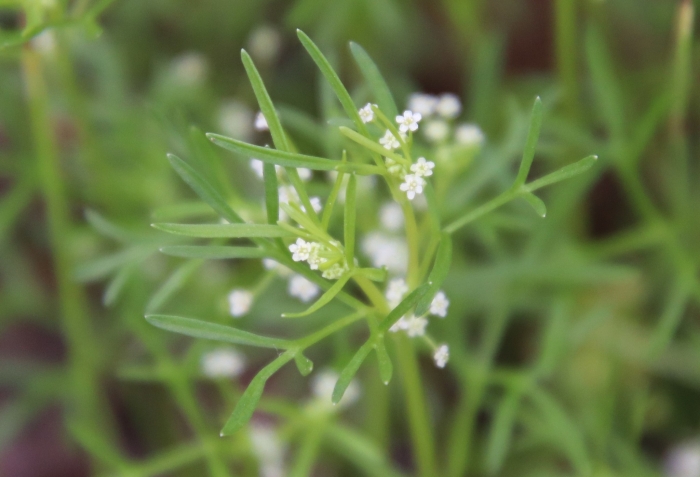Mock Parsley
(Apiastrum angustifolium)
Mock Parsley (Apiastrum angustifolium)
/
/

Millie Basden
CC BY 4.0
Image By:
Millie Basden
Recorded By:
Copyright:
CC BY 4.0
Copyright Notice:
Photo by: Millie Basden | License Type: CC BY 4.0 | License URL: http://creativecommons.org/licenses/by/4.0/ | Rights Holder: Millie Basden | Publisher: iNaturalist | Date Created: 2019-03-11T09:52:27-07:00 |











































Estimated Native Range
Summary
Apiastrum angustifolium, commonly known as Mock Parsley, is an annual herb that thrives in a variety of habitats including chaparral, grasslands, and open woodlands in California and Baja California. It is not typically found in dense forests. This plant can reach up to half a meter in height, growing from a taproot with a branching stem. The leaves are abundant along the stem, each up to 5 centimeters long, deeply dissected into narrow lobes. During the spring, Mock Parsley produces several compound umbels of tiny, white, five-petaled flowers that are modest in appearance but can add a delicate texture to garden settings.
Mock Parsley is valued for its drought tolerance and ability to adapt to various soil conditions, making it suitable for xeriscaping and naturalistic plantings. Its fine-textured foliage and subtle white flowers are often used to create contrast in wildflower gardens or as a filler in mixed borders. It prefers part shade but can tolerate full sun in cooler climates. Water requirements are low, and it is well-adapted to soils with medium to fast drainage. While not a common garden plant, it can be used for restoration projects and habitat gardens. It is relatively free of diseases and pests, but gardeners should be aware that it may self-seed and spread if conditions are favorable.CC BY-SA 4.0
Mock Parsley is valued for its drought tolerance and ability to adapt to various soil conditions, making it suitable for xeriscaping and naturalistic plantings. Its fine-textured foliage and subtle white flowers are often used to create contrast in wildflower gardens or as a filler in mixed borders. It prefers part shade but can tolerate full sun in cooler climates. Water requirements are low, and it is well-adapted to soils with medium to fast drainage. While not a common garden plant, it can be used for restoration projects and habitat gardens. It is relatively free of diseases and pests, but gardeners should be aware that it may self-seed and spread if conditions are favorable.CC BY-SA 4.0
Plant Description
- Plant Type: Herb
- Height: 1-2 feet
- Width: 1-2 feet
- Growth Rate: Moderate
- Flower Color: White
- Flowering Season: Spring
- Leaf Retention:
Growth Requirements
- Sun: Part Shade
- Water: Low
- Drainage: Medium, Fast
Common Uses
Bee Garden, Butterfly Garden, Edible*Disclaimer: Easyscape's listed plant edibility is for informational use. Always verify the safety and proper identification of any plant before consumption., Low Maintenance
Natural Habitat
a variety of habitats including chaparral, grasslands, and open woodlands in California and Baja California
Other Names
Common Names: Large Bullwort
Scientific Names: , Apiastrum angustifolium, Apiastrum latifolium, Apiastrum angustifolium var. tenellum, Aethusa capillacea, Apiastrum tenellum, Helosciadium leptophyllum var. latifolium,
GBIF Accepted Name: Apiastrum angustifolium Nutt.